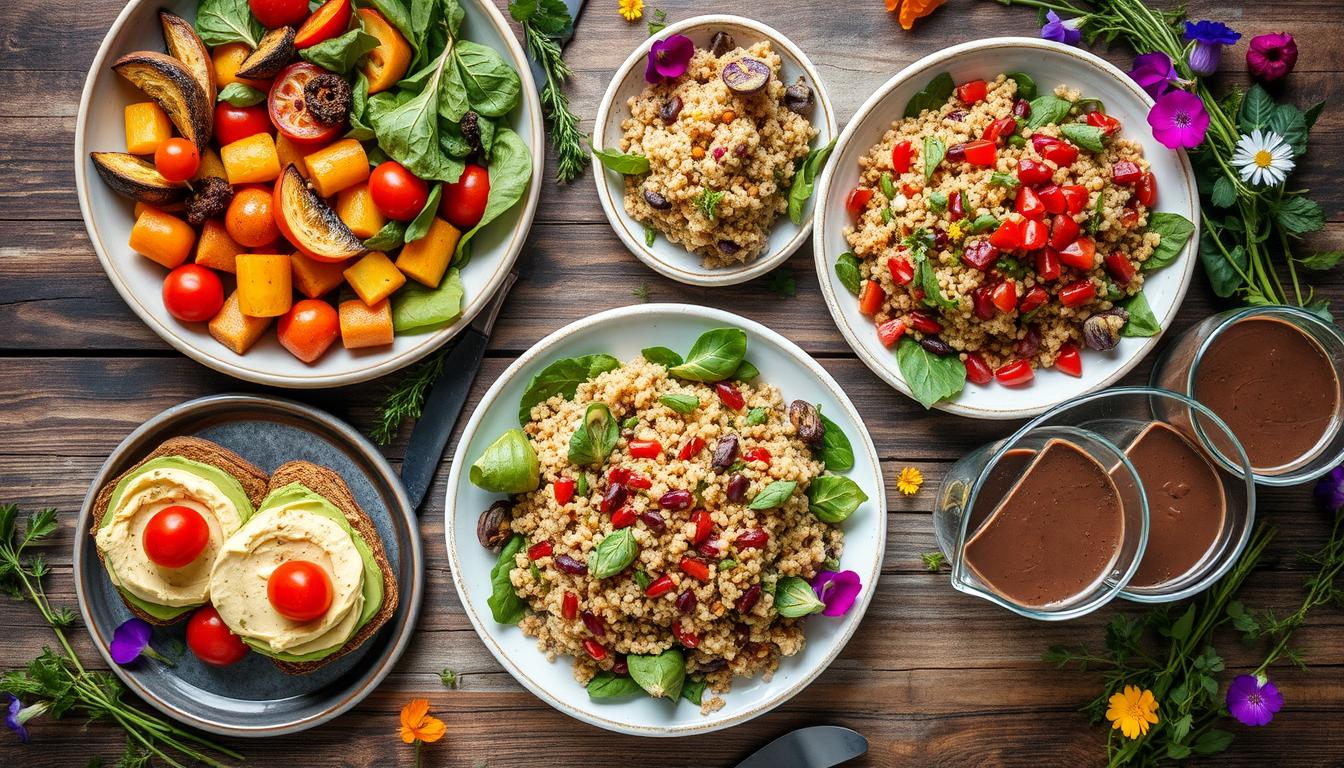In the ever-evolving culinary landscape, the demand for delicious, nutritious, and inclusive vegan and gluten free meals has reached new heights. As more individuals embrace plant-based cuisine and seek to accommodate a diverse range of dietary preferences and health concerns, the need for mouthwatering, allergen friendly dining experiences has become paramount. This article explores the rise of vegan and gluten-free meals, highlighting the growing popularity of these culinary options and the benefits they offer for optimal wellness and ethical food choices.
Key Takeaways
- Increasing demand for vegan and gluten-free options in social gatherings and family events
- Diverse range of colorful, healthy, and easy-to-prepare recipes suitable for a variety of dietary needs
- Importance of advance preparation and ingredient availability to reduce stress and ensure successful hosting
- Emphasis on nutrient-rich, clean-eating, and balanced meals that cater to various dietary restrictions
- Innovative use of alternative ingredients and cooking methods to satisfy diverse palates and lifestyle choices
The Rise of Plant-Based Cuisine
The culinary landscape is undergoing a remarkable transformation, with plant-based diets gaining unprecedented popularity. Driven by a growing desire for healthier and more ethical food choices, an increasing number of individuals are embracing the versatility and flavor of plant-based cuisine.
Embracing Dietary Preferences and Ethical Choices
The demand for vegan and gluten-free meals has expanded far beyond those with specific dietary restrictions. Consumers are recognizing the myriad of health and environmental benefits associated with a plant-based diet. From reducing the risk of heart disease and certain cancers to minimizing one’s carbon footprint, the appeal of vegan recipes and gluten-free options has captured the attention of the broader public.
Chefs and home cooks alike are rising to the challenge, showcasing their creativity and innovation in developing allergen-friendly dishes that cater to diverse palates. Restaurants like Namaste Indian Restaurant in Ulaanbaatar have become beacons of this culinary revolution, offering a wide range of plant-based, gluten-free options that delight the senses and nourish the body.
The global sales of plant-based meat have witnessed a staggering 76% increase from 2018 to 2021, according to the Global Food Institute’s 2021 Plant-Based State of the Industry report. Initiatives like Veganuary, which encourage individuals to commit to a plant-based diet for the month of January, have further fueled this growing trend.
As more people seek to align their dietary preferences with their ethical food choices, the culinary landscape continues to evolve, offering a vast array of delectable and nourishing plant-based options that cater to diverse tastes and lifestyles.
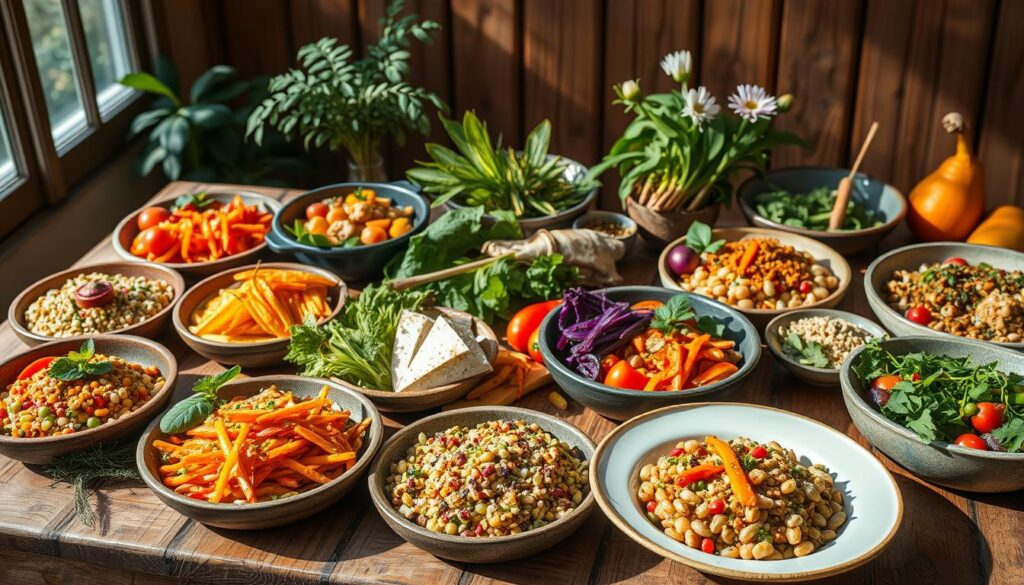
Allergen-Friendly Dining Experiences
In the ever-evolving culinary landscape, the demand for gluten-free dining, dairy-free options, and allergen-friendly menus has risen significantly. Restaurants, catering companies, and even home cooks are stepping up to provide inclusive dining experiences that cater to the needs of individuals with food allergies and sensitivities.
From Arizona to Florida, diners with various dietary restrictions have discovered allergen-friendly dining options that allow them to indulge in delicious, worry-free meals. In Tempe, Arizona, a restaurant managed by @serenesafe accommodates peanut, tree nut, milk, and sesame allergies, ensuring a safe dining experience. In Los Angeles, California, @missmeliss1895, with multiple allergies, enjoyed an allergy-friendly meal at a vegan Mexican restaurant in Monterey.
In Colorado Springs, Colorado, @caseymesmer directly addressed their milk allergy and found fast-food options in a vegan setup that met their dietary needs. In Fairfield, Connecticut, @shaeallergy07 experienced their first vegan restaurant due to a milk allergy, while in Pensacola, Florida, @allergystrategy found a completely vegan restaurant catering to their milk, egg, fish, and shellfish allergies.
The trend of accommodating dietary needs extends beyond individual restaurants. At Disney’s Polynesian Village Resort in Florida, the Kona Cafe offers a variety of gluten-free, dairy-free, and allergy-friendly options in a low-key setting. The restaurant’s refurbished interior and detailed allergy-friendly menu ensure a seamless and enjoyable dining experience for guests with diverse dietary requirements.
| Dish | Allergen-Friendly Features |
|---|---|
| Vegetable Nigiri | Gluten-free, safe for egg, fish/shellfish, milk, peanut/tree nut, and sesame allergies |
| Sautéed Red Quinoa with Salmon | Plant-based, gluten-free |
| New York Strip Steak | Gluten-free, safe for egg, fish/shellfish, peanut/tree nut, sesame, and soy allergies |
| Mashed Potatoes | Gluten-free, safe for multiple allergies (excluding dairy) |
| No Sugar Added Pineapple Haupia Cake | Gluten-free, dairy-free, vegan |
As the demand for inclusive dining experiences continues to grow, restaurants and food providers are rising to the challenge, ensuring that everyone can enjoy delicious, allergen-friendly meals without compromising on flavor or satisfaction.
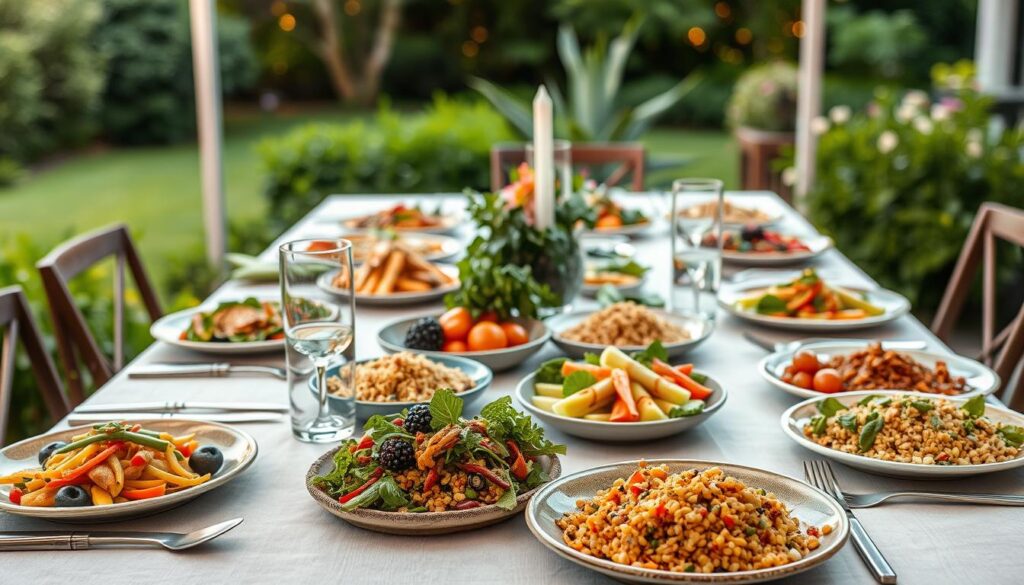
Clean Eating Options for Optimal Wellness
Embracing the principles of clean eating can be a transformative journey towards holistic health and well-being. By focusing on plant-based nutrition and nutrient-dense meals, vegan and gluten-free diets can nourish the body, boost energy levels, and reduce the risk of chronic diseases.
Research suggests that people following a vegan diet have a 75% lower risk of developing high blood pressure compared to omnivores. Furthermore, a vegan diet can lead to faster short-term weight loss and a decreased risk of type 2 diabetes, osteoarthritis, certain cancers, and heart disease.
To ensure optimal wellness, it’s essential to adopt a balanced, plant-based diet rich in whole, unprocessed ingredients. This can include a variety of legumes, nuts, seeds, whole grains, fruits, and vegetables, all of which provide essential nutrients, fiber, and antioxidants. Incorporating air-fried, baked, or sautéed plant-based dishes can help create satisfying, nutrient-dense meals without the need for unhealthy fats.
- Enjoy a creamy pasta salad with whole wheat noodles, apples, celery, and three layers of dill flavor.
- Try air-fried pizzas with a miso-infused cannellini bean sauce and various vegetable toppings.
- Indulge in a deluxe sandwich with umami-rich baked carrot slices and a homemade spread.
By embracing clean eating and incorporating more plant-based, nutrient-dense meals into your daily routine, you can nourish your body, promote optimal wellness, and embark on a journey towards a healthier, more vibrant life.
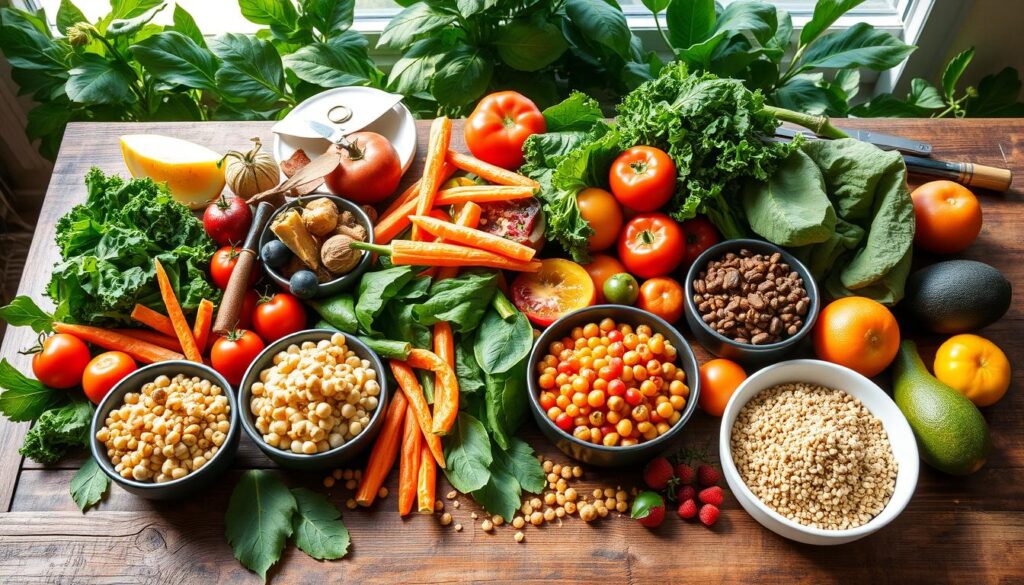
vegan and gluten free meals: A Culinary Exploration
In the realm of plant-based cuisine, the possibilities for delicious and satisfying vegan and gluten-free meals are truly endless. From savory vegan recipes that tantalize the taste buds to gluten-free dishes that cater to dietary preferences, the culinary exploration of these nourishing options is a delightful journey.
Embracing the versatility of plant-based ingredients, our culinary experts have crafted a diverse array of recipes that showcase the depth of culinary creativity possible in the vegan and gluten-free realm. With an average star rating of 4.4 across all recipes, these dishes have earned the trust and praise of discerning palates, proving that flavor profiles can be expertly balanced to satisfy even the most discerning tastes.
| Metric | Value |
|---|---|
| Highest star rating for a recipe | 5 out of 5 |
| Lowest star rating for a recipe | 0 out of 5 |
| Number of ratings per recipe | Range from 5 to 1048 |
| Percentage of recipes that are vegan | 100% |
| Percentage of recipes that are gluten-free | 100% |
From the indulgent vegan chorizo breakfast tacos to the satisfying Sweet Potato + Black Bean Taco with Guacamole, our culinary exploration showcases the vibrant and diverse flavors that can be achieved through the skillful use of plant-based ingredients. Whether you’re in the mood for a nourishing breakfast, a satisfying lunch, or a comforting dinner, our collection of vegan and gluten-free recipes has something to delight every palate.
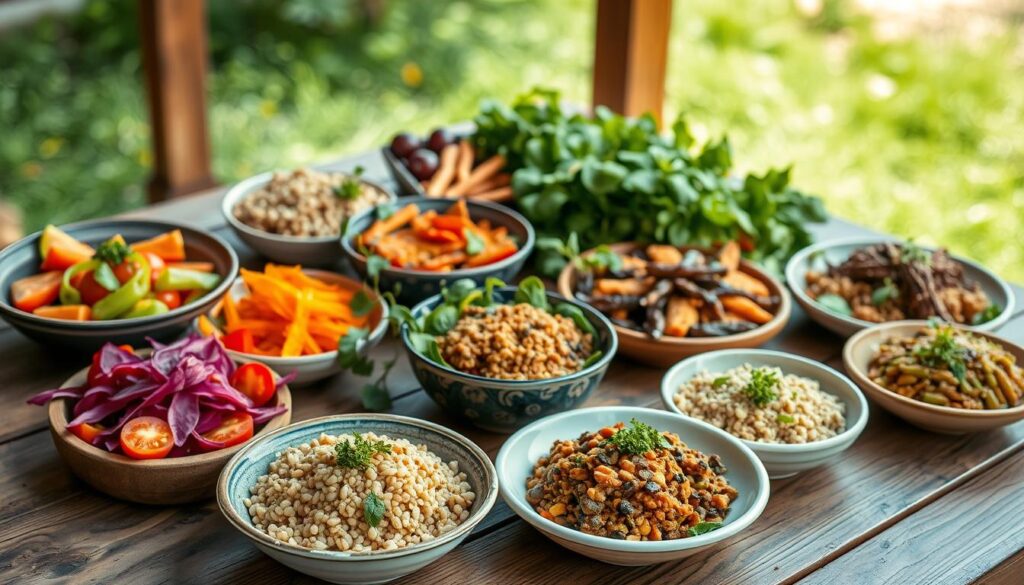
Embark on a culinary journey with us and discover the endless possibilities of vegan recipes and gluten-free dishes that will leave you captivated by the depth of flavor and the sheer artistry of plant-based cuisine.
Meatless Menus and Vegetarian Alternatives
Innovative Plant-Based Protein Sources
As the demand for meatless meals and vegetarian options continues to soar, chefs and food innovators are rising to the challenge with creative plant-based protein sources that satisfy both flavor and nutrition. From earthy lentil burgers to savory mushroom-based “meat” substitutes, the culinary landscape is undergoing a remarkable transformation, empowering health-conscious and environmentally-aware consumers to make more sustainable food choices.
Embracing the versatility of ingredients like chickpeas, cauliflower, and beans, these innovative plant-based dishes offer a wealth of protein-rich options for those seeking to reduce their meat consumption. Chickpea flour is now used to craft gluten-free pizza crusts, while millet serves as the base for flavorful sushi bites. Even classic comfort foods like chili and pot pies have found new life with the integration of wholesome, meatless ingredients.
The benefits of these meatless and vegetarian alternatives extend far beyond individual health, as they also play a crucial role in promoting environmental sustainability. By reducing our reliance on resource-intensive animal products, we can collectively contribute to a more eco-friendly food system that preserves our planet for generations to come.
| Innovative Plant-Based Protein Source | Dish Example | Key Ingredients | Nutritional Benefits |
|---|---|---|---|
| Lentils | Hearty Lentil Burgers | Brown lentils, gluten-free breadcrumbs, spices | High in protein, fiber, and complex carbohydrates |
| Mushrooms | Crispy Air-Fried Taquitos | Portobello mushrooms, cauliflower rice, black beans | Rich in umami flavor, low in calories, and a good source of antioxidants |
| Chickpeas | Shawarma-Inspired Cauliflower Dish | Chickpeas, cauliflower, Mediterranean spices | High in protein, fiber, and complex carbohydrates, and a great source of plant-based iron |
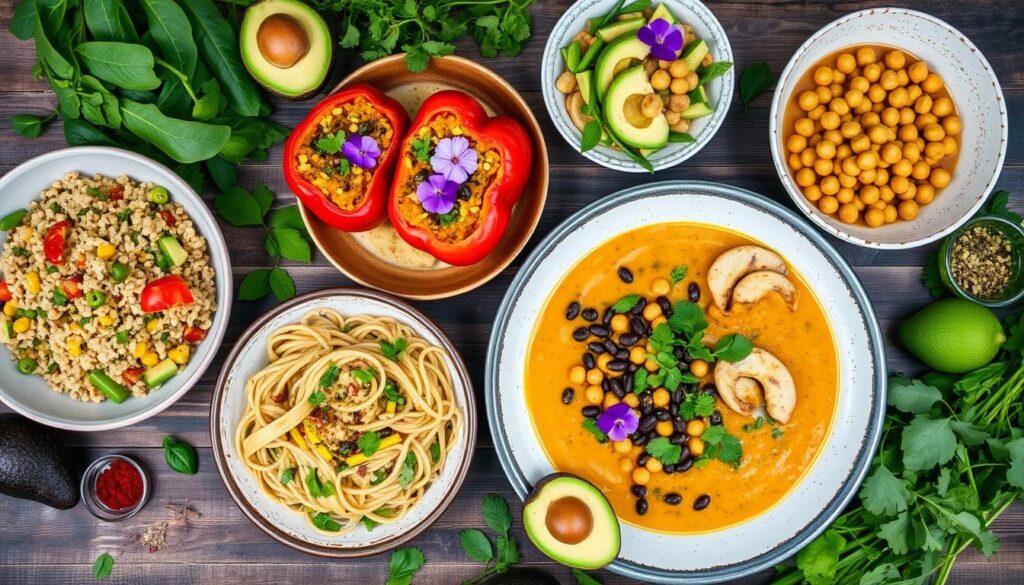
By embracing these innovative plant-based protein sources, we can enjoy delicious meatless meals and vegetarian alternatives that not only nourish our bodies but also contribute to a more sustainable future. Whether you’re a lifelong vegetarian or simply looking to incorporate more plant-based options into your diet, the culinary possibilities are endless and exciting.
Conclusion
As we’ve explored, the world of vegan and gluten-free meals is rapidly evolving, offering a diverse and delicious array of options that cater to a wide range of dietary preferences and ethical considerations. The surge in plant-based cuisine reflects a growing demand for inclusive dining experiences, where individuals can indulge in nourishing and sustainable food choices.
From the rise of allergen-friendly dining to the embracing of clean eating for optimal wellness, this culinary revolution is transforming the way we approach mealtimes. The exploration of meatless menus and innovative vegetarian alternatives has not only expanded our culinary horizons but also positively impacted the environment by reducing greenhouse gas emissions and promoting water conservation.
As we move forward, the continued popularity of vegan and gluten-free diets, driven by their numerous health benefits and ethical considerations, will undoubtedly shape the future of the food industry. By adopting a more plant-forward lifestyle and making sustainable food choices, we can collectively contribute to a healthier and more inclusive culinary landscape that caters to diverse dietary needs and preferences.
FAQ
What is driving the growing popularity of plant-based cuisine?
The growing popularity of plant-based cuisine is driven by a surge in individuals seeking to embrace dietary preferences and make ethical food choices. More people are recognizing the health and environmental benefits of a plant-forward lifestyle, leading to an expanded demand for vegan and gluten-free meals beyond those with specific dietary restrictions.
How are restaurants and home cooks adapting to provide allergen-friendly dining experiences?
Restaurants, catering companies, and home cooks are adapting their menus and preparation methods to provide safe and satisfying dining options for individuals with food allergies and sensitivities. They are focused on creating inclusive dining experiences that ensure everyone can enjoy delicious, worry-free meals, whether they have gluten, dairy, or other common dietary restrictions.
What are the benefits of incorporating clean eating principles into vegan and gluten-free meal planning?
Embracing clean eating principles when designing vegan and gluten-free meals can promote optimal wellness. These meals are focused on whole, unprocessed ingredients that nourish the body, providing balanced, nutrient-dense diets that can benefit overall health, energy levels, and disease prevention.
How are chefs and food innovators exploring the culinary possibilities of vegan and gluten-free meals?
Chefs and food innovators are showcasing the creativity and versatility of plant-based ingredients, developing innovative recipes and techniques that challenge the misconception of vegan and gluten-free cuisine being bland or limited. They are creating a diverse array of flavorful, visually appealing dishes that appeal to a wide range of palates, demonstrating the endless possibilities for delicious and satisfying vegan and gluten-free meals.
What are the environmental and ethical benefits of embracing meatless menus and vegetarian alternatives?
Embracing meatless menus and vegetarian alternatives provides environmental and ethical benefits. Food innovators are developing creative meat substitutes and protein-rich vegetarian dishes that deliver satisfying flavors and textures, empowering consumers to make more sustainable food choices that align with their values and contribute to a healthier, more inclusive culinary future.

